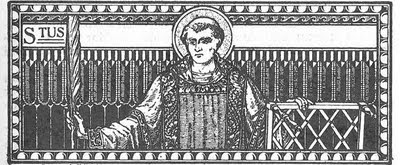St. Bernard of Clairvaux, Abbot and Doctor
The Church is pleased to honour during the octave of the Assumption St. Bernard, the honey-mouthed Doctor, Doctor Mellifluus, whose principal title of glory is to have celebrated with ineffable tenderness and ardent piety, in his prayers, his books and sermons, the varied greatness of Mary.
Born in 1091, of a noble Burgundian family, he succeeded at the age of 22 in winning over to Christ thirty noblemen who with him embraced monastic life at Citeaux. There the Cistercian Order, a branch of the old Benedictine trunk, acquired a new vigour which enabled it to cover the whole of Europe with its shoots. "The just," says the Offertory, "shall flourish like the palm-tree, he shall grow up like the cedar of Libanus." And in the famous monastery which Bernard founded a short time afterwards in the vale of Clairvaux on the left bank of the Aube, and whose first Abbot he became (Communion), he each day lavished on a community of seven hundred monks the treasures of doctrine and wisdom with which God endowed him and which make his name immortal (Introit, Epistle, Gradual).
An austere monk, a great Christian orator and a learned doctor, he was the luminary, mentioned in the Gospel, which enlightened the world in the twelfth century.
Pope Eugenius III, who had been trained by him to the monastic life, solicited and received his counsels; at the Council of Etampes, he put an end to the schism which, opposing Anacletus to Innocent III, troubled the clergy and people of Rome. He was consulted by William of Aquitaine, by the Duchess of Lorraine, by the Countess of Brittany, by Henry son of the King of France, by Peter son of the King of Portugal, by Louis VI, Louis VII, Conrad, Lothaire and by the Abbot of St. Denis. He silenced the famous Doctor Abelard at the Council of Laon, and his powerful logic unmasked the errors of Arnold of Brescia and of Peter de Bruys (Gospel). Lastly he attacked Islam and, by preaching the second crusade at Vezelay, he stirred up the whole of Europe by his overpowering eloquence.
St. Bernard died at Clairvaux on August 20, 1153, and his body was laid at the foot of the altar of the Blessed Virgin. He left 160 monasteries which he had founded in Europe and Asia. His writings, replete with doctrines inspired by divine wisdom, caused him to be placed among the Doctors of the Church by Pius VIII.
Let us have recourse to the intercession in heaven of the one who on earth taught us the way of life (Collect), let us ask him to give us his love for the Mother of God, and let us piously recite the anthem of the Season: Salve Regina, of which the three last invocations, O clement, O loving, O sweet Virgin Mary, are attributed to him.
In medio Ecclesiae aperuit os ejus: et implevit eum Dominus spiritu sapientiae et intellectus: stolam gloriae induit eum. * Bonum est confiteri Domino: et psallere nomini tuo, Altissime.
In the midst of the Church the Lord opened his mouth: and He filled him with the spirit of wisdom and understanding: He clothed him with a robe of glory. * It is good to give praise to the Lord: and to sing to Thy name, O most High.
(Ecclesiasticus 15:5 and Psalm 91:2 from the Introit of Mass)
Deus, qui populo tuo aeternae salutis beatum Bernardum ministrum tribuisti: praesta, quaesumus; ut, quem Doctorem vitae habuimus in terris, intercessorem habere mereamur in caelis.
O God, who didst give unto Thy people blessed Bernard to be a minister of eternal salvation: grant, we beseech Thee, that we may be worthy to have as an intercessor in heaven him, whom we have had as teacher of life on earth.
(Collect)
"If squalls of temptations arise, or thou fall upon the rocks of tribulation, look to the star, call upon Mary. If thou art tossed by the waves of pride or ambition, detraction or envy, look to the star, call upon Mary. If anger or avarice or the desires of the flesh dash against the ship of thy soul, turn thine eyes towards Mary. If, trouble by the enormity of thy crimes, ashamed of thy guilty conscience, terrified by dread of the judgment, thou beginnest to sink into sink into the gulf of sadness or the abyss of despair, think of Mary. In dangers, in anguish, in doubt, think of Mary, call upon Mary. Let her be ever on thy lips, ever in thy heart; and the better to obtain the help of her prayers, imitate the example of her life. Following her, thou strayest not; invoking her, thou despairest not; thinking of her, thou wanderest not; upheld by her, thou fallest not; shielded by her, thou fearest not; guided by her, thou growest not weary; favoured by her, thou reachest the goal. And thus dost thou experience in thyself how good is that saying: And the Virgin's name was Mary."
(St Bernard of Clairvaux)
[from a homily of St. Bernard of Clairvaux....]
From the Catholic Encyclopaedia:
http://www.newadvent.org/cathen/02498d.htm




































